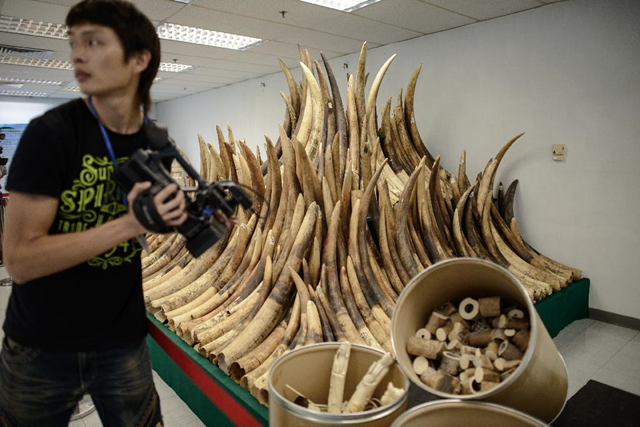China bans ivory imports for 1 year to protect elephants – ‘The announcement is largely a window-dressing exercise’
BEIJING (AP) — China imposed a one-year ban on ivory imports that took immediate effect Thursday amid criticism that its citizens’ huge appetite for ivory has fueled poaching that threatens the existence of African elephants. The State Administration of Forestry declared the ban in a public notice posted on its official site, in which it said the administration would not handle any import request. […] Wildlife protection advocates welcomed the step but said it falls short of addressing a root issue in China — its large stockpile of legal ivory that provides for a legitimate domestic market. “This domestic ivory market confuses consumers, removes stigma about ivory consumption, provides cover for criminals to smuggle ivory, hinders law enforcement, and stimulates poaching of elephants,” said Grace Ge Gabriel, Asia regional director for the International Fund for Animal Welfare. London-based Environmental Investigation Agency, which issued a scathing report suggesting Chinese government officials were involved in procurement of illegal ivory in Africa, called the announcement a “window dressing.” “It is unfortunate that (Chinese authorities have) not announced a much-needed policy change by banning all domestic trade in ivory — this is the policy change that could actually make a difference for elephants in Africa,” said Shruti Suresh, wildlife campaigner for the agency. [more]
China bans ivory imports for 1 year to protect elephants 
27 February 2015 (Environmental Investigation Agency) – China spurred a flurry of international press reports yesterday (February 26) when it appeared to announce a ban on ivory imports into the country. The State Forestry Administration (SFA) released SFA Notification (2015) No.2 which, translated, reads: After research it is decided that, from the date the Notification is released to February 26, 2016, China will temporarily ban the import of carved African ivory products, obtained after the CITES [international ivory trade ban] took effect, the SFA will temporarily stop processing relevant administrational permits and issues. The SFA was quoted in the Chinese media as stating: “Recently, due to poaching, habitat loss, human and elephant conflict, war and violence, weak enforcement and poverty among other reasons, wild African elephants are facing critical pressure, which has already been noticed [acknowledged] by the international community. “China, as a signatory and party member, should be seriously implementing its relevant international obligations. By adopting this temporary ban on carved ivory products obtained post-CITES, we aim to make a positive impact on promoting and supporting elephant conservation. This temporary measure, which will last for one year, is in order to observe, understand and scientifically evaluate the impact on elephant conservation by having such a measure in place. In turn we can take further steps to adopt more effective measures, together with African countries and the international society, to collectively make efforts for the conservation of wild elephant population.” While welcoming the announcement as a positive step coming from China, EIA Executive Director Mary Rice remains sceptical as to its actual value and likely impact. “The ‘temporary ban’ does not apply to the massive domestic legal ivory market in China which continues to perpetuate the desirability of and illegal trade in ivory, stimulates demand and provides an avenue for laundering illegal ivory. So, in effect, the announcement is largely a window-dressing exercise,” she said. “This parallel legal trade in ivory undermines enforcement and demand-reduction efforts. It will continue to be business as usual for the more than 180 licensed ivory-processing and retail facilities in China because this notification, which remains ambiguous, only bans specific imports of ivory carvings and does not prohibit legal domestic sales of ivory within China. “It would also be a fundamentally flawed analysis if China were to use the implementation of such a flimsy measure as an excuse to determine that ivory trade bans don’t work. “At a time when elephants are being killed in their thousands, little meaningful impact can come from such a limited approach. China has the wherewithal to emerge as a world leader and champion in the fight against ivory trafficking by adopting a total ban on domestic trade in ivory – this is the policy change that would actually make a difference for elephants worldwide.”
China’s carved ivory import ban ‘largely window-dressing’
